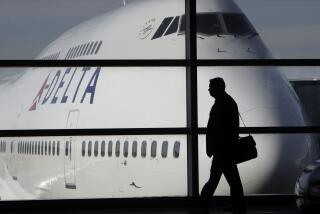Questions of Air Safety Buffet ValuJet : 34 Violations Found in Probe Before Shutdown
- Share via
WASHINGTON — The Federal Aviation Administration uncovered 34 serious violations of air safety regulations in its probe leading up to the shutdown of ValuJet Airlines, including one case in which ValuJet failed to report that a flight lost cabin pressure and was forced into an emergency descent, according to a consent order disclosed late Wednesday that the air carrier signed with the agency.
Under the consent order, ValuJet must pay the FAA $2 million to cover the agency’s costs in investigating the airline, but the order appears to leave open the possibility of later civil or criminal fines.
The consent order also discloses that ValuJet, once it resumes operation, will be able to operate only 15 of its current fleet of 51 jets--a condition FAA officials had not previously announced. Earlier this week, the FAA forced the Atlanta-based discount carrier to suspend its operations indefinitely.
ValuJet spokesman Gregg Kenyon said the company had not yet determined what it will do with the 36 aircraft exempted from future operation. Kenyon said the company owns all of its aircraft.
“It is going to take us some time to develop how we are going to move forward,” Kenyon said. “That is what we are focused on right now.”
Kenyon asserted that the violations alleged by the FAA are no different than what the agency would find at any other airline it scrutinized as closely as ValuJet has been.
FAA Administrator David Hinson said Tuesday that the agency conducted four years’ worth of investigations in four weeks at ValuJet, a measure of just how much scrutiny the airline received.
The consent order contains an attachment that discloses a laundry list of FAA findings, including a number of instances in which the company operated aircraft that had serious defects.
The FAA found in one case that the company flew a jetliner for seven flights after it discovered the cockpit windshield had started to delaminate. In another case, it operated a plane for nine flights after making improper temporary repairs to a flap that was damaged by lightning, the agreement shows.
Other discrepancies include a panel that was missing five of its 12 screws, improperly rigged emergency slides and incorrect parts being used. The company also operated at least seven aircraft with malfunctioning toilets on at least 79 flights.
The incidents together violated 14 FAA regulations, according to the consent order. While the order does not constitute an admission of those findings by ValuJet, the company did agree to a lengthy list of remedies.
When Hinson was pressed at a news conference Tuesday on why the FAA had not acted more quickly against ValuJet and whether federal officials had been too quick to vouch for the airline immediately after the May 11 accident, Hinson said the agency has limited legal powers.
“Look, an airline has a legal ticket to operate,” Hinson said. “I have no authority other than some very unusual emergency authority, nor does anybody, to stop them from exercising that certificate without proof that will stand up in a court of law.”
Under the consent order, the airline agreed to 11 specific actions, including gaining sufficient technical capability to conduct its own cursory maintenance inspections of jetliners that had previously been farmed out to subcontractors.
ValuJet agreed to pay $500,000 to the FAA immediately upon executing the consent order and another $1.5 million within 10 days of resuming operations or within 60 days. The company has more than $200 million cash on hand, so the payment does not represent a financial threat to the firm.
More to Read
Inside the business of entertainment
The Wide Shot brings you news, analysis and insights on everything from streaming wars to production — and what it all means for the future.
You may occasionally receive promotional content from the Los Angeles Times.











